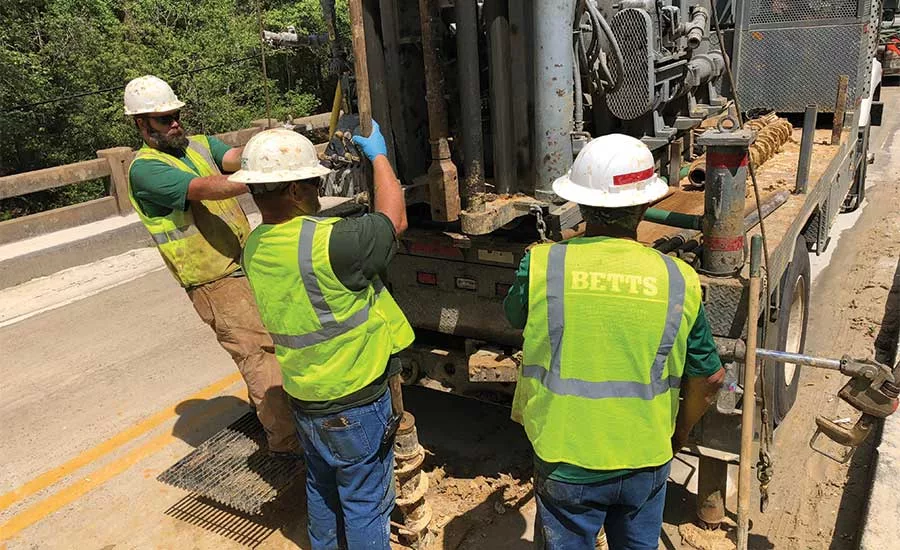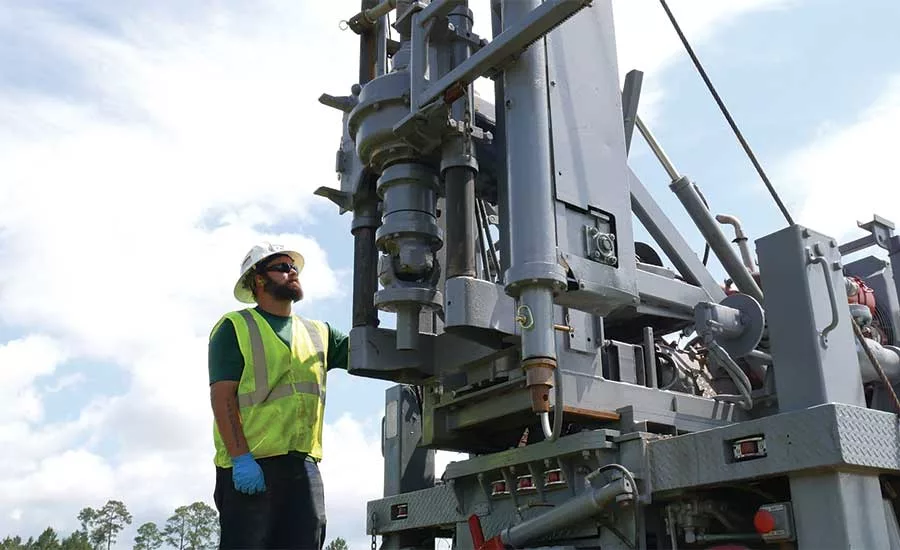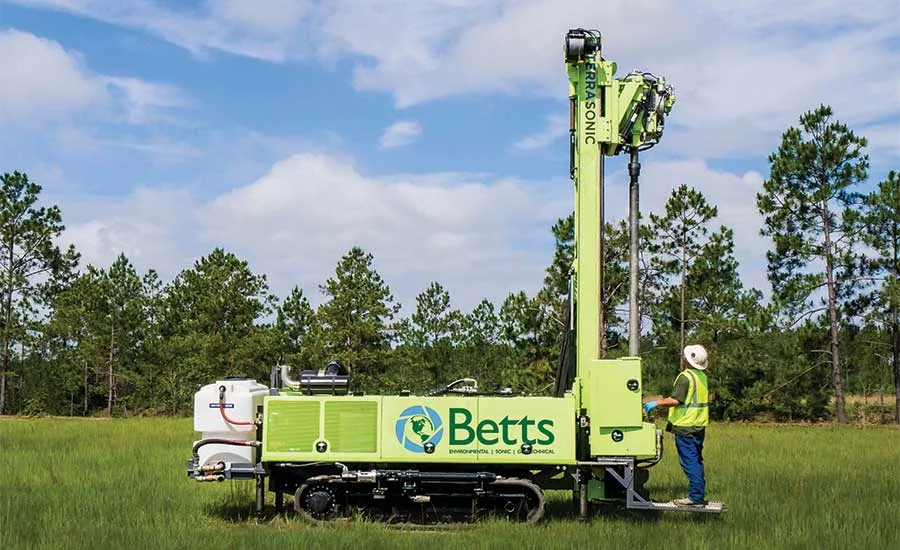Success in the Drilling Business through Evolution

The company has worked on projects ranging from the Atlanta Braves new stadium to military bases to celebrity homes.
Source: Betts Environmental photos

Betts focuses on a set of core values including a good work ethic, a customer-centric attitude, attention to detail and a drive to always go the extra mile.

Betts became interested in sonic drilling in 2016, and bought their first sonic drilling rig in 2017.
Source: Betts Environmental photos

Betts has managed to succeed over the years because the company has continually — and consistently — adapted to the ever-changing industry.
Life is about evolution: change, growth, lessons learned and progress. As individuals, we evolve as we grow up and experience life — and the same can be said about companies.
What may have worked in the beginning might not be as fruitful after a few years. Maybe an unexpected niche is found. Or maybe success lies in the challenges.
Betts Environmental has experienced almost all of this and more. The company started out in 1993 from Tony Betts’ parent’s living room. Betts was just 28 years old when he opened the company with his father.
Since then, technology has evolved. Drill rigs have advanced. Business practices have changed. And through it all, Betts has focused on keeping up with the rapid, ever-changing drilling industry by evolving.
The Beginning
Betts did not start out as a driller. He worked on his family farm all his life until the fall of 1993, when he began doing some fieldwork that involved pulling up and working on underground storage tanks. In 1994, he started Betts Environmental. The company worked on smaller jobs around southern Georgia until they received a call to help clean up a big petroleum spill in Columbus, Ga.
Turns out, some underground tanks were heavily leaking and 3 feet of petroleum had built up on top of the city’s groundwater supply. City officials were forced to shut down 10 blocks of the downtown because of it.
Tony, his father and their one employee operated excavators, digging 15-foot trenches to pull the groundwater and separate it. They also set up some recovery wells with their very first (and only) drill rig: a 10-foot-tall, 5-foot-wide machine that drilled about 20-feet deep — and ran on an 8-horsepower lawnmower engine. The rig only had two wheels, and they transported it by pulling it behind their pickup truck.
“[That job] was good exposure for us at that time. That’s where we really got our big break and really made a good showing. We got to know a lot of people at the state levels,” Betts says.
It was on that job that Betts decided they needed to buy their first full-size rig. In fact, he was even asked by a guy on the Columbus job if they had a bigger rig because he wanted to drill deeper, and Betts replied earnestly, “No, but we’ll get one.”
Within that week, they bought a new rig, learned to use it and began operating it. “And that was the beginning of what it has evolved into 25 years later today,” Betts says. “That was the beginning of the business right there.”
The Early Days
The industry took notice of the small crew from southern Georgia, and Betts started getting referrals from all over Georgia and Florida. Because of the increase in workload, Betts decided they needed more locations.
Thus, in 1996, Betts opened an Atlanta office. Then, in 2002, they moved to a new facility in Adel, Ga., Betts’ hometown. A Jacksonville office was started in 2006, followed by a Tallahassee office in 2012. And with that, the company went from being operated out of Betts’ living room and an old tobacco barn to one that has since opened four locations.
So, how did the company go from a two-man team with one drill rig to a company with a fleet of vehicles and multiple offices? It happened because Betts has the same core values today that he had 25 years ago when he first started the company: a good work ethic, customer-centric attitude, attention to detail and a drive to always go the extra mile.
“[We did it] by providing a good service that clients were not used to seeing. This is a service industry; we provide a specialized service,” Betts says. “And we’re doing what we told them we were going to do, and being there on time and leaving the site cleaner than it was when we got there. We have to meet on pretty much every jobsite an engineer or a geologist, and we’re sitting there waiting on them when they get there. And they’re not used to that. They’re used to drillers showing up two hours late or four hours late. When we told them we would be there at 7 o’clock that morning, we would be there at 6:30.”
Betts has also managed to succeed over the years because the company has continually — and consistently — adapted to the ever-changing industry. For example, equipment is more technologically-advanced now with automatic features that promote ease-of-use and increased efficiency.
“Rigs have automatic hammers [now] for environmental and geotechnical work, where you basically pull a lever and it goes to work. The old ones were pulled manually by a rope, which was pretty dangerous work,” Betts says.
The company has six drill rigs on tracks, which progressed from their original truck-mounted rigs that could only travel on pavement or gravel. With the track-mounted rigs, they can go through difficult environments like wooded areas. They also started mounting their drill rigs on off-road equipment, like ATVs, in order to travel to even more difficult-to-get-to sites that their clients needed work in.
Over the years, Betts has moved from lawnmower engine-powered rigs to Geoprobe direct-push technology. When they started to have clients call and tell them about the troubles of scheduling a line locator, they solved that problem by doing ground penetrating radar to clear borings and make sure there are no underground utilities, like gas mains and electrical lines. They evolved not for themselves, but for the client. That constant evolution led them to a new market and niche — sonic drilling.
The Middle
Over the last 10 or 15 years, there has been an increased demand for sonic drilling — something Betts noticed in his region, as well as with his clients.
“We had been asked through the years as we grew, people would say, ‘Oh, do you guys have a sonic drill rig?’ and we’d say, ‘No, we’re not ready for that yet.’ Because it’s a pretty big investment to take on. In 2016, we really started looking into it, and last year, we really got serious about it.”
That’s when Betts decided to buy their first sonic track-mounted drill rig. “And it has been basically non-stop since it came off the truck,” he continues.
To put it simply, sonic drilling is a faster, more efficient way of drilling. It’s usually three to six times faster, produces up to 80-percent less waste, offers less than 1-percent drill string deviation, 100-percent sample recovery and no refusal.
It also allows for drilling in geological formations that weren’t possible before. It can drill through granite and bedrock — according to Betts, 10 feet in 10 minutes — which an auger couldn’t even penetrate in the first place.
Not only that, but it’s much safer — something that Betts appreciates.
“With the emphasis on safety these days … that sonic is a much safer drill rig to run than your conventional drill rig. It’s pretty much [due to] the tooling that goes into the ground. With your conventional drill rigs, you’ve got augers, which could grab your shirt when it’s sitting there spinning or grab your shovel and pull you into it,” he says. “Sonic rigs have a slick casing that has nothing that can grab you and wrap you around it. ... The safety level is so much higher. There’s not as large a chance for an accident as there is with a conventional rig.”
One of the reasons safety is so important to Betts is because of the value he places on his employees. Over the years, he’s found that hiring and keeping the best employees to meet the company’s standards is how they stay successful.
“We’ve been very blessed with work with good people,” he says. “We have guys that have been here 18 years. ... I hate the word ‘employee.’ We all work together. We all work for the greater good of the company. We’re team members around here; we’re all on the same team. Good team members are our greatest asset."
The Future
Being in the drilling industry since 1993, Betts has continued to grow and evolve, and is always looking at what they can do better.
One thing that has never faltered? Their willingness to tackle the hard stuff.
“If you’re not growing and getting better every day, you’re just stagnant.”
– Tony Betts
“I think that’s what sets us ahead of other companies. We don’t just say, ‘Oh, we can’t do that.’ They come to us for the difficult stuff. Anyone can do the 25-foot borings, but very, very few — a handful in the U.S. — can do the 200-foot borings. The challenges are just a part of everyday work here,” he says.
With that spirit at the helm, Betts’ goal every year is do better than the last. He hopes to keep growing, fine-tuning and, ultimately, being better than yesterday.
“If you’re not growing and getting better every day, you’re just stagnant,” he says. "We want to be a one-stop shop for all our client's environmental needs.”
The company is hoping to reach an entirely new level of growth with a “rebranding” of the Betts Environmental brand — a facelift, if you will. It involves updated logos, a new website, pictures, social media and more. Oh, and possibly even a new office and a second sonic drilling rig.
Betts is expecting big things and hopes that it’ll help them get ready for the next 25 years.
“It’s been a fun 25 years. We’ve been blessed with a lot of work and a lot of great people. And a lot of great clients too. That’s the real key to success,” he says.
Looking for a reprint of this article?
From high-res PDFs to custom plaques, order your copy today!







